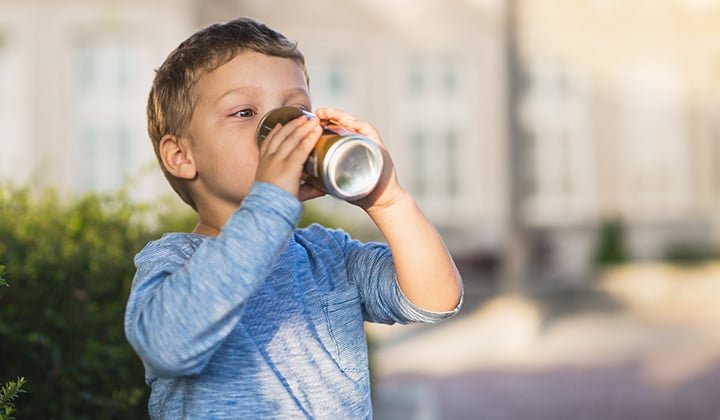
Every way we turn it seems we are surrounded by sugar-sweetened beverages and overwhelmed with ads for those oh-so-tempting drinks. The truth is sugar-sweetened beverages are consumed way too often and are not so good for children’s health. Here is what you should know about sugary beverages and some healthier alternatives.
The not-so-sweet facts
Sugar-sweetened beverages are any drink that contains added sugar. These include, but are not limited to, regular sodas, sports drinks, fruit drinks, sweetened flavored waters, energy drinks and sweetened teas or coffee. These beverages are the most consumed source of added sugar in our diets. Sugar-sweetened beverages have a lot of calories and minimal if any nutritional benefit. A 20-oz bottle of soda has around 240 calories and 65 grams of added sugar. More than 5 tablespoons of sugar!
Consuming too much added sugar, especially from sugar-sweetened beverages, can increase a child’s risk for obesity, tooth decay and many other health-related problems. If kids drink these types of drinks a lot, especially soda and energy drinks, it can also impact bone health. These beverages can affect how the body absorbs calcium and impact bone density during a child’s primary growth and development years. Another downside to sugar-sweetened beverages is they are often drunk in place of other healthier drinks like milk and water.
You should also be cautious of sports drinks. Advertising would suggest they are helpful for kids during physical activity, but, they contain added sugar and are not necessary for hydration, especially for activity lasting less than 1 hour. Drinking plenty of water and eating a well-balanced diet will provide all the hydration and electrolytes a child needs when playing sports or other physical activity.
How much is too much added sugar?
We know the average child consumes way more added sugar than they should and about half comes from sugar-sweetened beverages. So, how do you know how much is too much when it comes to sugar-sweetened beverages? There are some national guidelines for added sugar to help you decide how much added sugar intake is too much. The American Heart Association recommends less than 25 grams, or 6 teaspoons, of added sugar daily for children, while the 2020-2025 Dietary Guidelines recommends calories from added sugar not exceed 10 percent of total daily calories. These guidelines are based on added sugar in the diet from ALL foods and drinks, not for sugar-sweetened beverages alone. Many other things we consume besides sugar-sweetened beverages have added sugar. Foods like candy, some condiments, cakes and cookies all have added sugar.
The updated nutrition facts label makes it easy to identify added sugar in foods and beverages and helps you make informed choices. On labels, you will now see “added sugar”’ on a separate line. Check the nutrition label if you are ever unsure if a food or beverage has added sugar.
Limiting sugary drinks
It can be tough for all of us but try to remember, moderation is key. It is not about eliminating or never having a sugar-sweetened beverage again. It is about being mindful of how much and how frequently they are consumed. Try to make sure your child has plenty of other more nutritious, non-sweetened beverages throughout the day keeping them hydrated.
Here are some tips for reducing sugar-sweetened beverage consumption:
- Give water and milk instead of sugar-sweetened beverages at mealtime.
- Drink water with a splash of 100% fruit or vegetable juice.
- Watch serving sizes and consume only one serving at a time! A standard serving is only 8 oz, but many sugar-sweetened beverages come in sizes ranging from 12 oz, 20 oz, or up to 32 oz (Which is 4 servings!).
- Add slices of fresh fruit and vegetables like cucumbers, berries, oranges, lemon and lime to water to enhance the taste and appeal.
- Carry a reusable water bottle with you and send one with your child to school to refill throughout the day with water instead of purchasing sugar-sweetened beverages.
